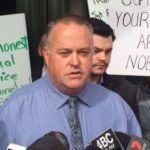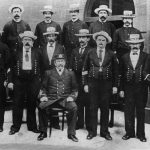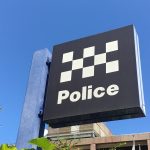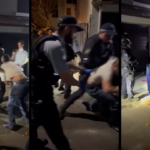AntiCop on Why Young People Should Not Consider a Career in the NSW Police Force
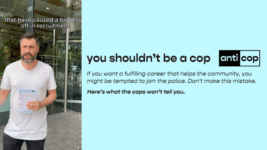
The New South Wales Police Force has had difficulty recruiting officers over the 2020s. So, it’s just commenced the You Should Be a Cop school program, which aims to get high schoolers in years 10 to 12 interested in a career in law enforcement. The campaign was launched on 18 September 2025, while anticop’s been out picketing the recruitment drive to explain why becoming a cop is a terrible idea.
Founder of the online police education resource Tom Raue and other anticop members were out the front of the NSW Police Force Recruitment Branch on Wangal land in Olympic Park on 29 October 2025, handing out You Shouldn’t Be a Cop flyers, detailing a large list of footnoted reasons why young people in their final years at high school shouldn’t contemplate joining the thin blue line.
NSW police is the largest police force in the country. In September, it had 15,900 police officer positions occupied. However, that’s with the potential to have an authorised 18,400 officer positions filled, which means the force is operating at 86 percent capacity. Vacancies for officers climbed by about 200 over the last 12 months, which means total job vacancies rose to around 2,500.
The drop in interest in joining the state law enforcement agency coincides with a general loss of trust in public institutions over the 2020s, while the 2020-21 COVID-19 period served to damage public trust in the police force as well, because officers were charged with enforcing extreme and at times, absurd restrictions on the public over the pandemic lockdown periods.
In countering the police recruitment drive, anticop warns a career as “a cop in NSW can do a lot of harm to yourself, your family and community”, as the culture of the NSW Police Force has long been understood to be one steeped in racism, misogyny and homophobia, while, as some officers on the beat found over the pandemic, at times the function of the police in the community is destructive.
Don’t make that mistake
“The NSW Police Force has a recruitment problem for a reason,” explained anticop founder Tom Raue. “The workplace is rife with bullying, sexual harassment and racism. Officers are called upon to strip search children and respond to mental health calls with inadequate training, often killing desperate people who need healthcare.”
“The violence inherent to policing coupled with NSW police’s toxic culture leaves many cops with psychological injuries, like post-traumatic stress disorder,” he told Sydney Criminal Lawyers.
According to anticop, a job in law enforcement is less dangerous than in agriculture or forestry, but when it comes to policing, psychological harm is par for the course. Seventy four percent of work compensation claims with state law enforcement are due to post-traumatic stress disorder or PTSD. Indeed, the NSW auditor general found NSW police does nothing to prevent these psychological injuries.
The brochure that anticop has produced and distributed initially raises the issue of the toxic police culture, which leads to one in three women working for NSW police making a sexual harassment complaint. Cops who report a sexual assault or misconduct while working for the NSW police are promptly demoted and ostracised, while a recent review of the culture was put on permanent delay.
In terms of being a police officer harming one’s family, studies from the 1990s revealed that 40 percent of policing families experienced domestic violence, while the culture further has a focus on “protecting mates”, which means DV complaints are downplayed. Yet, 57 serving officers still faced domestic violence charges last year, despite the coverup culture, with three having been convicted.
These are just some of the reasons why anticop heads its brochure with the warning, “If you want a fulfilling career that helps the community, you might be tempted to join the police.” Then it further advises to not “make this mistake.”
Yet another spate
“Aside from the damage to your mental health and family relationships, becoming a cop isn’t even a good way to deal with crime,” Raue continued. “Time after time, the data shows us that reducing poverty is the best way to reduce crime. Instead of wasting money on police and prisons, we should be investing in public healthcare, education and housing.”
Another key issue that’s come to the fore recently is that of NSW police officers being sent out to deal with mental health episodes, while they’re not trained mental health professionals. So, police officers are being deployed to deal with people in crisis, and due to a lack of training, this often leads to officers killing the person they’re supposed to be there to assist.
The fact that NSW police are killing people having mental health crisis rises to the front and centre of the media cycle periodically, with the last spate commencing when an officer tasered a 95-year-old woman suffering dementia and using a walking frame at a nursing home in May 2023. The use of the device on the great-grandmother caused her to fall, hit her head and die in hospital a week later.
By January 2024, four further incidents occurred in which NSW police likely killed a civilian having a mental health crisis. Then in July this year it happened again, with officers restraining 45-year-old gay man Colin Burling to death on Gadigal land out the front of his home in Sydney’s inner suburb of Waterloo. Restraining people to death is a common habit of police officers right across the continent.
The inadequacy of NSW police being first responders to such crises was considered by a mid-2023 upper house inquiry that delivered its report mid-last year and recommended establishing a version of the Right Care, Right Person model adopted by London police, which involves a second emergency phoneline that allows for expert responders to be dispatched to such crises, without risk of police.
Many NSW police officers complain about having to undertake these mental health checks, as they’re well aware that they’re not equipped or trained to properly deal with them. Yet, NSW authorities simply leave this issue to die down again after a spate of killings, as the correct place for this problem appears to be in the dustbin, according to the NSW government.
A dying trade
“If somebody wants to strip search children, waste time on the war on drugs and work in an environment steeped in bullying and misogyny – they can join the police. Otherwise, you shouldn’t be a cop,” Raue underscored. “If people want a career helping people, they should become a firefighter, paramedic or a teacher.”
Growing numbers of ex-officers have been decrying the ongoing pursuit of illicit substances on the part of law enforcement, whether that be the pursuit of traffickers at the borders, the tracking down of suburban dealers to the most popular sport of hitting up people for personal drug possession, as a staggering waste of time and resources that does nothing to stop the flow and use of drugs.
Another occurrence that’s shifted opinion on police was the May 2020 killing of African American man George Floyd by Minnesota police. This murder sparked global Black Lives Matter protests, with the focus here on the persecution and brutalisation of First Peoples by the NSW police and other local forces, and at this time, concepts like defunding and abolishing the police were mainstreamed.
“Our flyers are designed to educate potential recruits and the broader public on the harms of policing – both to cops themselves and the whole community,” Raue added in terms of his campaign.
“Young people considering joining the police deserve the truth, so anticop will continue to distribute our information at police recruitment events,” the anticop founder said in ending.



